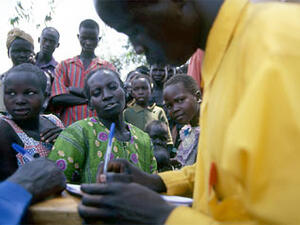Lubbers urges more focus on humanitarian needs
Lubbers urges more focus on humanitarian needs
GENEVA - A month after the start of the military campaign in Afghanistan, UN High Commissioner for Refugees Ruud Lubbers on Thursday reminded the international community of its humanitarian commitment to help innocent civilians caught up in the conflict.
"As the military effort to fight terrorism enters its second month, we need to underscore the commitment made by coalition leaders to the Afghan people that this war is not against them, and that the humanitarian effort will remain a priority," Lubbers said. "With winter nearly upon us, millions of Afghans are in need of some type of humanitarian assistance. Hundreds of thousands of people have fled their homes, but continuing insecurity is hampering humanitarian efforts to help them inside Afghanistan. At the same time, they are unable to seek refuge outside because all neighbouring borders are officially closed. As a result, many desperate Afghans have nowhere to turn."
While recognizing the enormous refugee burden already shouldered by countries in the region, Lubbers again appealed to neighbouring states to open their borders to those in need of temporary protection and assistance. He noted that some progress was being made with Pakistan authorities on making camps available for assisting recent arrivals who managed to make it into the country via back roads and mountain paths - an estimated 135,000 people since September 11. Many of them have been afraid to seek help because they fear being deported as "illegals."
In Iran, sites have been identified and humanitarian stocks pre-positioned, but the border remains closed. Inside Afghanistan, a few makeshift camps have sprung up near the borders with both Iran and Pakistan. However, UNHCR has serious concerns over the security of these sites, which are in both Taliban and Northern Alliance territory.
In addition to its emergency preparations in neighbouring countries, UNHCR is examining how it can continue and possibly expand its programmes inside Afghanistan, where the agency works with more than 100 small, local NGOs on projects aimed at helping returning refugees rebuild their lives. UNHCR has been present in the region for two decades and has helped more than 4.6 million Afghans to return home since 1988.
Lubbers said enormous planning, effort and resources are being devoted to the war against terrorism, but many urgent humanitarian needs remain to be addressed by the international community.
"The fight against terrorism is necessary," Lubbers concluded. "But there is also a concomitant international duty to help the Afghan people - both inside and outside - and to make good on the promises made to them at the beginning of this conflict that they are not the target of this war and will not be forgotten."






